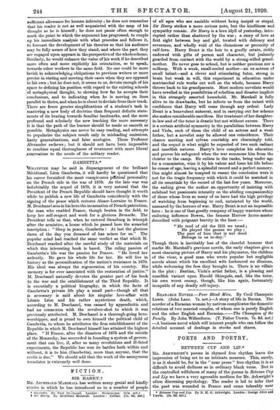GAMBETTA.*
'WHATEVER may be said in disparagement of the brilliant Meridional, Leon Gambetta, it will hardly be questioned that his career furnished the most conspicuous political personality on the French side in the war of 1870. As the late war was indubitably the sequel of 1870, it is very natural that the President of the French Republic should have thought it worth while to publish a new life of Gambetta coincidently with the signing of the peace which restores Alsace-Lorraine to France. M. Deschanel sees in his hero tho incarnation of French patriotism, the man who enabled France, though beaten in the field, to keep her self-respect and work for a glorious Revanche. The President tells us that, when he entered Strasburg in triumph after the armistice, a house which he passed bore the scrawled inscription : " Sleep in peace, Gambetta ! At last the glorious dawn of the day you dreamed of has arisen for us." The popular mind had reached the same verdict as that which M. Deschanel reached after the careful study of the materials on which this interesting book is based. The ruling passion of Gambetta's life was the passion for France. " He loved her ardently. Ho gave his whole life for her. He will live in history as the personification of the nation's resistance in 1870. His ideal was always the regeneration of his country. His memory is for ever associated with the restoration of justice." M. Deschanel naturally devotes the greater part of his book to the war and the establishment of the Third Republic. It is essentially a political biography, in which the facts of Gambetta's private life play a small part—though all that is necessary is said about his singular love-affair with Leonie Leon and his rather mysterious death, which, according to M. Deschanel, was caused by appendicitis and had no connexion with the revolver-shot to which it was previously attributed. M. Desehanel is a thorough-going hero- worshipper, and is proud to own himself the political child of Gambetta, to whom he attributes the firm establishment of the Republic in which M. Desehanel himself has attained the highest place. " If France, after the disasters of 1870 and the suicide of the Monarchy, has succeeded in founding a system of govern- ment that can live, if, after so many revolutions and ill-fated experiments, the Republic has won its battles both within and without, it is to him (Gambetta), more than anyone, that the credit is due." We should add that the work of the anonymous translator is extremely well done.


































 Previous page
Previous page